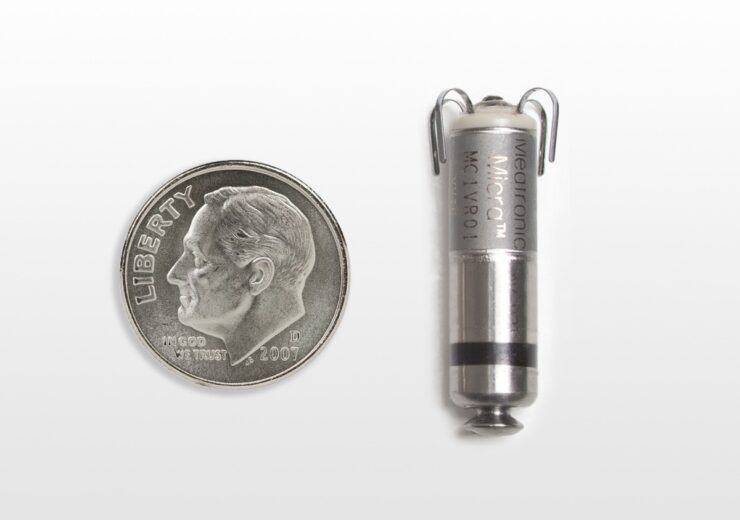The Micra AV2 and Micra VR2 pacing systems, said to be the world’s smallest pacemakers, are designed to provide improved battery life and programming than their prior versions and deliver several benefits of leadless pacing compared to traditional pacemakers

Micra pacemaker and Dime. (Credit: Medtronic)
Medtronic has received the US Food and Drug Administration (FDA) approval for its new generation of miniaturised leadless pacemakers, Micra AV2 and Micra VR2.
The new pacemakers are designed to provide improved battery life, simplified programming, and deliver several benefits of leadless pacing, compared to traditional pacemakers.
Also, the Micra AV2 and Micra VR2 pacing systems are said to provide around 40% enhanced battery life compared to their previous versions.
The Micra AV2 pacing system comes with an estimated median battery life of nearly 16 years, and the Micra VR2 with a median battery life of 17 years.
Medtronic said that Micra AV2 and Micra VR2 are the smallest in the world, measuring less than one-tenth the size of traditional pacemakers.
Also, more than 80% of patients who receive a Micra pacemaker are likely to require only one device for their entire life, said the healthcare technology company.
Medtronic cardiac pacing therapies general manager Robert Kowal said: “Our goal is to improve the patient experience by continuously reinventing our ground-breaking leadless pacemaker.
“Since inventing the first battery-operated cardiac pacemakers 65 years ago, Medtronic has transformed pacing technologies to benefit patients, including the nearly 200,000 patients globally who have received a Micra device so far.”
The new Micra AV2 features advanced algorithms that automatically programme AV synchrony and coordinate with the heart’s upper and lower chambers.
Also, Micra AV2 comes with a high available tracking capability, which increased from 115 to 135 beats per minute for upper limits, for patients with faster heart rates.
Unlike traditional pacemakers, Micra pacemakers eliminate the need for leads or a surgical pocket under the skin, phasing out the potential sources of complications, said Medtronic.
Duke University Health System electrophysiologist Camille Frazier-Mills said: “Improved AV synchrony – requiring less in-office reprogramming thanks to algorithm optimisation – and longer battery life are major wins for patients.
“I’m excited to offer my patients the new Micra devices. This best-in-class technology transforms the patient experience by eliminating pocket-related complications, and now reduces the chance that patients will need their device changed in the future.”
